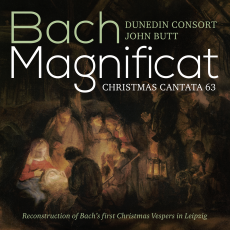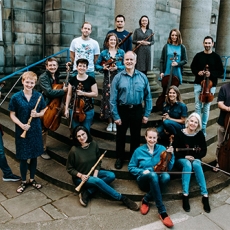Dunedin Consort - J.S. Bach: Magnificat - MusicWeb International
The headline news is that, though I have many other very fine recordings
of the two major works, Cantata No.63 and the E-flat version of the Magnificat with the Christmas interpolations,
this new recording just about outdoes them all.
This is not the first of John Butt's Bach recordings to be reconstructions of
actual liturgical celebrations that might have occurred during his time in
Leipzig: in this case we have a credible reconstruction of his first Christmas
Vespers in the Nikolaikirche in 1723.
I'm not going to renege on my recommendation of the Herreweghe, but John Butt
has gone one further and created a sense of occasion by opening with a Gabrieli
motet and interpolating appropriate organ preludes and congregational hymns.
With a CD filled almost to bursting, a few items have had to be left out, but
these can be downloaded free from Linn:
the organ prelude Der Tag der
ist so freudenreich, BWV650, the congregational pulpit hymn Ein Kindelein so loebelich and the final collect, responsory and
blessing. It's a bit fiddly to insert these tracks in the right place -
perhaps Hyperion could have included them with the download. I put them
into a sub-folder labelled ‘bonus tracks' and Winamp read them as tracks 31-34,
after the main tracks 1-30. If you download the ‘digital de luxe' version
from Linn the tracks are in the right places.
The opening work, an 8-part motet by Giovanni Gabrieli, is included in a North
German collection of the time: it would have been sung by the very best singers
from the Thomasschule, though it seems unlikely that they would have been as
accomplished as the team on the new recording - the five named soloists plus
Katie Schofield, Malcolm Bennett and Dominic Barberi, with organ, cello and
violone accompaniment, who get the album off to a flying start.
The organ pieces are just as welcome as the vocal works. It was as a
performer of Bach's organ music on the Harmonia Mundi label that John Butt
first came to my attention: his recording of the Schübler Chorales and preludes
and fugues on and of the Trio Sonatas.
The first organ piece here, the Prelude BWV600, from Orgel-büchlein, is well up to
the standard of those earlier recordings and the Greyfriars organ, restored in
1990, makes a good baroque sound. The booklet lists this as Gott, durch deine Güte, but
it's also known as Gottes Sohn
ist kommen, which is more appropriate to Christmas, and the download track
carries the latter title. Nor are the remaining organ pieces any less
well performed. As John Butt notes in the booklet these preludes were
intended not to be played one after the other in a 70-minute CD programme, as
we normally hear them now, but to set the mood for a following choral work.
I've heard some very fine recordings of Cantata No.63 but this knocked me off my perch from
the start, capturing the joyful spirit of the work more than any other that I
know. Bach brought this cantata with him from Weimar and it may have
seemed a little too exuberant for the staid burghers of Leipzig. A good
performance should have had the congregation dancing in the aisles - the text
exhorts them to join the round dance: Kommt,
ihr Christen, kommt zur Reihen. Butt's interpretation might have
tempted them to climb up the organ loft but such was not the staid Lutheran way
in Bach's day, despite Martin Luther's own love of joyful music and his
expectation of joining the Reihe(round
dance) in Heaven.
The performance of the Magnificat has the same dancing qualities as the
Cantata, though it's the latter that really persuaded me to make this a
Recording of the Month. You may not wish to have the Christmas
interpolations all year round, so they have been separately tracked.
That's fine if you can be bothered to programme them out but I prefer to keep
them. The practice of interpolating other music in the Magnificat at Christmas, in Latin and German, had
been common for some time before Bach: Hieronymus Prætorius's Magnificat Quinti toni, which
features on a very fine recent recording, interpolates a number of extra
verses: Joseph, lieber Joseph, Omnes nunc concite, Hodie apparuit and, verse by verse, In dulci jubilo. (A
Wondrous Mystery: Stile
Antico, Harmonia Mundi HMU807575).
I listened to the recording as a 24/96 download and the sound is every bit as
impressive as the performances. Past experience of comparing 24-bit Linn
downloads and their SACD equivalents suggests that it's equivalent to the HD
stereo layer of the disc.
The notes in the booklet are extremely valuable, especially in setting the
music in liturgical context and in arguing the case for the use of the older Tief-Kammerton or ‘French pitch', approx. A=392, for
strings and woodwind, thus allowing the trumpets to perform in the higher
‘baroque pitch'Kammerton or Cammerton of 415 in their native key of D, as
they do in the other version of theMagnificat in D. D at the higher pitch =
E-flat at the lower. Those seeking further elucidation will find a
helpful article on this complex subject in the Oxford Companion to Music (Pitch, 3).
Even if you have another recording of either, or even both, of the main works
you will be bowled over by this new recording. It's top of my Christmas
2015 list so far and I expect it to remain so.


